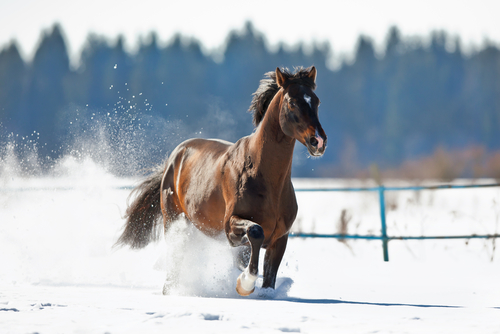
While most horses often prefer and benefit more from living outdoors, colder temperatures require a few more special care considerations to keep your horses healthy and happy. Once they are acclimated to the cold weather, consider the following tips for water needs, feeding, shelter and more. However, bear in mind that horses that require special care during the summer will also need special attention throughout the winter, as well. Read on to ensure your horses are well taken care of this winter season and protect your business with a custom-tailored MO Equine Business Insurance program.
Water needs.
Hay contains less moisture than grazing, and since grass is less abundant during the winter, your horse’s feeding and water intake will need to be adjusted. There are two common complications resulting from inadequate water consumption during cold weather: decreased feed intake and impaction colic. Even if quality feed is offered, horses will consume less if not drinking enough water. If less feed is consumed, horses might not have enough energy to tolerate the cold, says the University of Minnesota. This is especially important to remedy as dry fecal matter can result in impaction or intestinal blockage.
10-12 gallons a day should be provided at a slightly warmed temperature (45-65 degrees F) to promote proper consumption. Remember, relying on rainfall and snow is not ideal for meeting your horses’ water needs as there are serious health risks involved with consuming high quantities of each.
Feeding.
When the weather reaches approximately 18 degrees F, this is a critical temperature for your horse to require more food to sustain the energy needed to keep warm. For each additional degree below 18 degrees F, on average, your horse requires 1% more food. This varies depending on your horse’s body, fur, and fat storage. Talk to your vet about ensuring proper care and feeding regimens during the winter.
Shelter.
The University of Minnesota states that horses should have access to shelter from wind, sleet, and storms. Free access to a stable or an open-sided shed works well, as do trees if a building is not available. In the absence of wind and moisture, horses tolerate temperatures at or slightly below 0°F. If horses have access to a shelter, they can tolerate temperatures as low as -40°F.
Blanketing.
Blanketing protects your horse’s coat from becoming wet or matted and losing heat quickly. Place a blanket over your horse after drying him or her off to help retain heat. This is especially important for horses that do not have shelter from the harsh winter elements, have thin coats or if the temperature falls below 5 degrees F.
About Sine Insurance Group
At Sine Insurance Group, we are dedicated to insuring equine businesses like yours. Our customized policies are designed with you in mind to secure each facet of your operation and to provide the peace of mind you deserve. For more information, contact us today at (855) 700-0889.

